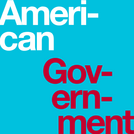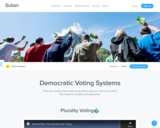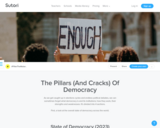As we get caught up in elections cycles and endless political debates, we can sometimes forget what democracy is and its institutions; how they work, their strengths and weaknesses. It's divided into 5 sections.
The state of democracy
The first part looks at the overall state of democracy across the world. After definining what a democracy is, we're look at how not all democracies are equal in measure, with some having more functioning democratic institutions than others. A useful recap of the other major types of government will feature.
Checks and balances
The separation of powers (legislative, executive and judicial) come from the premise that concentrating power in the hands of one person, party or government can have a detrimental effect on society. Hence why power and functions are distributed across separate and independent entities.
Thriving political culture
A democracy is more than voting once every x number of years. It's first of all making sure everyone who is elligible to vote can easily do so (obstacles are common). Political culture is also determined through the freedom to contest and protest.
Transparency, accountability & corruption
It is a given that a functioning democracy, with politicians elected by the people who get to decide how tax-payer money is spent, decision-making processes and accounting should be as transparant and corruption-free as possible. Unfortunately, lobbying and other forms of corruption are proven to be a hindrance on democracy as a whole.
Media: the fourth power
What is discussed in media outlets - from podcasts to TikTok videos, news articles to TV news bulletins - can have a significant impact on society, raising matters of public interest, forcing politicians to take position, debate and take action.
Hence the importance of a free press. One that is independent, can speak openly about any issue, criticise the government if need be, without fear of reprisal. It is also crucial that information is transparent, that journalists can access information on what governments are doing without hindrance.
--
Part of the political science collection.







